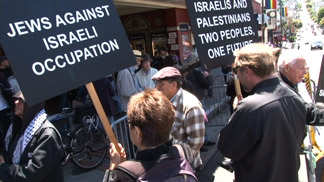On the origins of the film
Deborah Kaufman
The film originally was going to be called Discontinuity because it was really about addressing questions of change when there's a lot of intermarriage, when we're revisiting historical questions about the Holocaust and the establishment of the state of Israel, all these things that are hot buttons within the Jewish community.
And particularly within our own families, where we came from backgrounds that were very engaged. My father was very involved as a Zionist, Alan's mother was a Communist. These are the secular faiths of American Jews that we wanted to explore.
But what happened was everything kept being drawn back toward arguments about Israel and the relationship of the American Jewish community to Israel. And as we got into our production, every argument kind of circled back to that. We wanted to explore that in a way that was respectful but at the same time critical.
And underlying everything was the fact that there was a real hostility to open debate both from the right and the left, and that was very visible at the film festival.
Alan Snitow
Both sides got together, the extremes, sort of silencing debate in the middle, at the Jewish film festival, and this has happened throughout.
One of the things we found out: Many, many people inside the Jewish community feel that they're not entitled to speak, that they're not legitimate, that they're not authentic enough , that they don't know Hebrew. All these kinds of things that undermine people's thinking, 'why don’t I have a real right to say something or what I think or ask questions?'
And we also found that's a feeling outside the Jewish community. There are a lot of people who don't want to get involved in this debate because it's too toxic or they don't want to be called an anti-Semite. Or they'd be showing their ignorance.
So we thought the purpose of the film had to be to raise these issues in a public way and say, look, the only way of making any kind of progress or dealing with change is to have them out in the open and really debate them.
I think people are somewhat justifiably afraid, because of the long history of victimization, of people attacking the existence of the state of Israel, of a minority community always sort of circling the wagons. There are long traditions of that sort. Recently this has, I think, expanded exponentially because now you have a very conservative government in Israel that is cracking down on debate inside Israel itself.
So how do American Jews, primarily a liberal community, deal with supporting Israel at the time when Israel is violating both internally with its down debate and in the occupied territories with the Palestinians many of the liberal values that American Jews have grown up with?
Deborah Kaufman
The Jewish community has long been a community of debate. So the fact that it has become so vicious -– it's an argument, not a debate; people are screaming at each other –- I think is significant because it shows that something's really changed internally.
You can say in part it's due to the Tea Party summer that happened in 2009 and the kind of general aura of bullying and vituperation that exists in the media and in our communities, but I think this question about the direction of Israel, particularly since the most right-wing government it's ever had, is challenging the American community to face its values and make some hard choices. And I think that's triggering a lot of the amplification of the argument and it's also triggering a kind of walking away by the younger generation that doesn't want to get involved with these toxic arguments anymore. That's also why we wanted to make this movie, to draw people back into the debate that we think should be happening in a more civil way.
